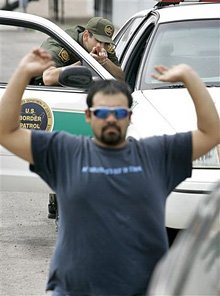 |
 |
 |
 News from Around the Americas | May 2007 News from Around the Americas | May 2007  
Academy Takes on Biggest Expansion In US Border Patrol History
 Jacques Billeaud - Associated Press Jacques Billeaud - Associated Press


| | To prepare trainees for the rigors of field work, the academy teaches them to monitor the border, drive in high-speed and off-road situations, and lessons in immigration law, government ethics and Spanish. |
Artesia, N.M. A trainee swings a rubber baton at the knees of three instructors wearing padded suits and helmets, acting out a scenario some of the new Border Patrol agents brought in during an ongoing hiring push could face if they are attacked and outnumbered in the field.

The exercise at the Border Patrol Academy here is necessary because the Border Patrol, with 8,000 miles of land and coastal borders to police, sends most full-fledged agents into the field without partners and backup could be far away.

A plan by President Bush to strengthen those borders is bringing more recruits to the academy in southeastern New Mexico. The agency plans to increase the number of agents from about 12,000 last year to 18,000 by the end of 2008, the biggest expansion in the Border Patrol's nearly 82-year history.

The Border Patrol is trying to meet the goal by launching two 50-student classes each week for the 17-week training regimen at the academy, compared with one class every two or three weeks before Bush announced the expansion.

The number of recruits coming in has prompted the government to begin building a 600-bed dorm, bring in temporary buildings for new offices and classrooms and erect a second mock highway checkpoint to teach trainees about questioning motorists. More retired agents also have been hired to work as instructors.

We are a lot busier, said Agent Clark Messer, a training supervisor at the academy. As long as we have the facilities and the instructors, it doesn't really change whether you have five classes on board or whether you have 25 classes on board.

So far, the academy has turned out more than 1,000 new agents since the expansion began in earnest about seven months ago.

Some current and former agents have expressed concerns that the Border Patrol, in facing pressure to meet the hiring goal, is taking short cuts in its training. The Border Patrol said it isn't compromising its training and that any changes grew out of an effort to match its lessons with the needs of agents.

The agency said it's taking a more aggressive approach in recruiting than it did during its last big expansion, when it added nearly 5,000 new agents in a five-year effort that began in 1996.

At least 125 recruiters are hitting military bases, universities, job fairs and other spots to draw from a pool of military members, police officers, teachers, plumbers, bankers and recent college graduates.

Recruits must have either a college education or a year of work experience that exposed them to stressful situations demanding quick decisions.

They are required to pass a drug screening, medical exam, physical fitness test and an interview by agency officials. They can't have felony or domestic violence convictions and must agree to a background investigation that examines the last 10 years of their lives.

The first assignment for the 6,000 new agents is at the country's busy southern border, where rookies will continue their training with journeyman agents who will serve as their mentors.

Trainee Eddie Ray II, who had worked in Army intelligence before becoming a state narcotics agent in Mississippi, said he was attracted to his new job because it will provide a better balance between work and family.

I'm going to get a good paycheck out of this deal. I'm going to get my good family time, said Ray, who graduated from the academy in April and is now working near McAllen, Texas. When I was with state narcotics, I was never home, so this kind of combines the best of all worlds.

Starting pay ranges from $35,000 to $45,000, depending on the education and previous work experience of each agent.

To prepare trainees for the rigors of field work, the academy teaches them to monitor the border, drive in high-speed and off-road situations, and lessons in immigration law, government ethics and Spanish.

Trainees also learn to fire pistols and assault rifles, find cover in hostile situations and make judgment calls on when to use deadly force. And three rail cars also were brought to the academy so trainees can learn to search trains for stowaways.

Like other prospective agents, trainee David Narrance was drawn to the Border Patrol by the opportunity to work outdoors.

Narrance, a former home loan processor for a bank in Phoenix, said one of his college professors had advised him of the growing opportunities for work in federal law enforcement agencies.

The more I looked into it, the more I wanted to do that, get away from the desk job, Narrance said.

Trainee Mario Bedolla, a native of Mexico who became a U.S. citizen, said a Border Patrol recruiter approached him while Bedolla worked at a detention center for another federal immigration agency.

Bedolla said his strengths as a Border Patrol agent will be the discipline he learned while serving in the U.S. Army and his deep understanding of Mexican culture.

Being from there, I know what people do, Bedolla said. I know the language. I know the way they carry themselves.

U.S. Border Patrol: www.cbp.gov | 
 | |
 |



